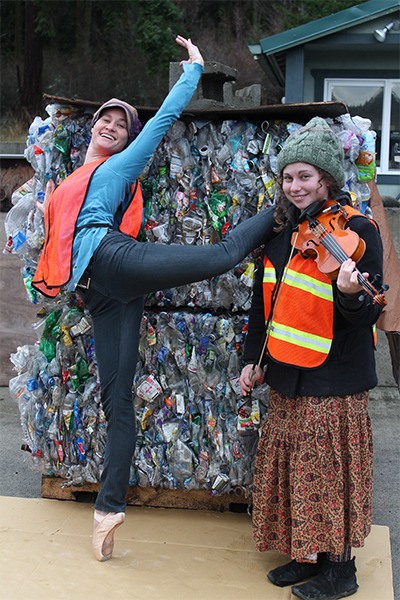Submitted by Lopez Solid Waste District
Anyone who is astonished at the current dip in gas prices knows how rapid economic markets can change.
Recycling markets are no different. In last month’s article, Lopez Solid Waste Disposal District discussed the reasons that we, as a community-run transfer station, have changed our self-sorting bins for plastic recycling in 2015: the markets have changed.
Previously our plastics were sold at half a penny a pound. With our new system, the higher value plastics, like the #1 PETE and #2 HDPE, earn between $.15 and $.21 per pound.
We now have created dedicated bins for each, so we bale these plastics individually to get the highest possible price.
A good metaphor is if you are harvesting your garden to sell at the farmers’ market and have tomatoes, cucumbers, carrots and kale. You wouldn’t likely toss them all together and accept the lowest price.
Therefore, by having separate bins for each of the highest value plastics makes the most sense/cents. So we have gone back to sorting by numbers with a few changes.
Visually there is a clear difference between a carrot and a tomato, but it’s not as clear why a #1 plastic bottle is different from a #2 or #7.
This has to do with the types of resin that the plastics contain. Plastics have only had numbers since 1988, when the Society of the Plastics Industry began the labeling system to identify what kinds of resins had been used and assigned numbers to each. This was done for the express purpose of recycling.
The U.S. Environmental Protection Agency reported that in 2012, 32 million tons of all types of plastic were generated in the U.S., but only 9 percent of that was recovered by recycling.
However, 31 percent of all #1 PETE and 28 percent of #2 HDPE plastics were recovered by recycling in 2012. This is because both are very valuable resins and relatively easy to recycle.
The community of Lopez is unique. We are known in the north west for some of the least contaminated recyclables.
As a whole our population is well informed and educated. Plus we care.
For those interested, there is a more detailed explanation of each number, its place on our site and uses on our website: www.lopezsolidwaste.org.
We have compressed our first bales of these plastics in 2015. We want to thank the community for your new self-sorting dance as it has allowed us to bale individual plastics according to their numbers.
Now that the west coast dock strike is over we can sell our bales and will report back to the community on the price.
Remember, too, that we now recycle all steel free of charge. Lopez is one of the most well-educated and proactive recycling communities anywhere in the U.S., and we are deeply grateful for this community’s participation.



